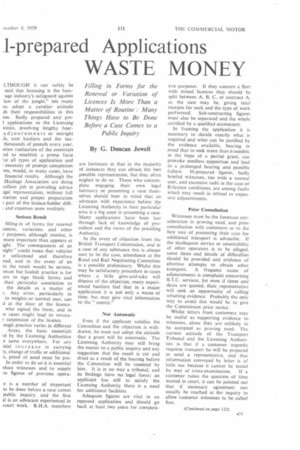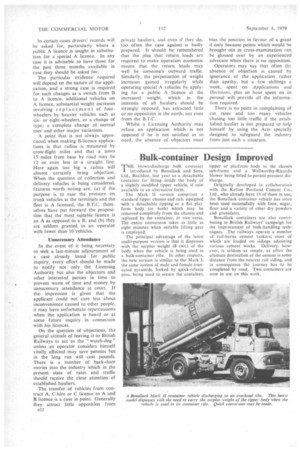1-prepared Applications WASTE MONEY
Page 65

Page 66

If you've noticed an error in this article please click here to report it so we can fix it.
Filling in Forms for the Renewal or Variation of Licences Is More Than a Matter of Routine : Many Things Have to Be Done Before a Case Comes to a Public Inquiry
133 G. Duncan Jewell
LTHOUGH it can safely be said that licensing is the haulage industry's safeguard against law of the jungle," too many Is adopt a cavalier attitude ds their responsibilities in this ion. Badly prepared and preI applications to the Licensing )rities, involving lengthy hearadjournments or outright cost hauliers and the taxthousands of pounds every year. ietter realization of the essentials .ed to establish a prima facie or all types of application and necessity of prompt completion ms, would, in many cases, have financial results. Although the Haulage Association are doing cellent job in providing advice :gal representation, without full !ration and proper preparation part of the licence-holder del. and expenses soon multiply.
Serious Result
filling-in of forms for renewal cences, variations and other r purposes, although routine, is more important than appears at ight. The consequences of an sight' could mean that vehicles e unlicensed and therefore ired, and in the event of an nt the result would be serious. lmon but foolish practice is for ors to sign blank forms and their particular association to the details as a matter of :. Any error, particularly in to weights or normal user, can
d at the door of the licencewho signed the form, and in ie cases might lead to revocar suspension of the licence. ough practice varies in different Areas, the basic essentials xl by the Licensing Authorities
e same everywhere. For any -dial increase in carrying change of traffic or additional s, proof of need must be proIn order to do so it is essential duce witnesses and to supply Lte figures of previous opera .e is a number of important to be done before a case comes public inquiry, and the first II is an advocate experienced in court work. R.H.A. members
are fortunate in that in the majority of instances they can obtain the best possible representation, but they often neglect to do so. Those who contemplate engaging their own legal luminary or presenting a case themselves should bear in mind that an advocate with experience before the Licensing Authority in their particular area is a big asset in presenting a case. Many applications have been lost through lack of knowledge of procedure and the views of the presiding Authority.
In the event of objection from the British Transport Commission, and in a case of any substance this is almost sure to be the case, attendance at the Road and Rail Negotiating Committee is a possible preliminary. Whilst this may be satisfactory procedure in cases where a little give-and-take will dispose of the objection, many experienced hauliers feel that in a major application it is not only a waste of time, hut may give vital information to the "enemy."
Not Automatic Even if the applicant satisfies the Committee and the objection is withdrawn, he must not adopt the attitude that a grant will be automatic. The Licensing Authority may still bring the matter to a public inquiry and any suggestion that the result is cut and dried as a result of the hearing before the Committee will be resented by him. It is in no way a tribunal, and its findings have no legal force; an applicant has still to satisfy the Licensing Authority there is a need for additional facilities.
Adequate figures are vital in an opposed application and should go back at least two years for compara
live purposes. If they concern a fleet with mixed licences they should be split between A, B, C, or contract A. as the case may be, giving total receipts for each and the type of work performed. Sub-contracting figures must also be separated and the whole certified by a qualified accountant.
In framing the application it is necessary to decide exactly what is required and what can be justified by the evidence available, bearing in mind that to seek more than is needed, in the hope of a partial grant, can provoke needless opposition and lead to a prolonged hearing and possible failure. Ill-prepared figures, badly briefed witnesses, too wide a normal user, and excessive radii in the case of B-licence conditions, are among faults which may result in refusal or expensive adjournments.
Prior Consultation Witnesses must be the foremost consideration in proving need, and prior consultation with customers as to the best way of presenting their case for additional transport is advisable. If the inadequate service or unsuitability of other operators is to be alleged. some dates and details of difficulties should be provided and evidence of abortive attempts to obtain other transport. A frequent cause of adjournments is complaint concerning B.T.C. services, for even if times and dates are quoted, their, representative will seek an opportunity of calling rebutting evidence. Probably the only way to avoid this would be to give the Commission prior notice.
Whilst letters from customers may be useful as supporting evidence to witnesses, alone they are unlikely to be accepted as proving need. The current attitude of the Transport Tribunal and the Licensing Authori ties is that if a customer urgently requires transport he will be prepared to send a representative, and that information conveyed by letter is of little use because it cannot be tested by way of cross-examination. If a customer raises the question of time wasted in court, it can be pointed out that if necessary agreement can usually be reached at the inquiry to allow customer witnesses to be called first. In certain cases drivers' records will be asked for, particularly where a public A licence is sought in substitution for a special A licence. In any case it is advisable to have those for the past three months available in case they should be asked for.
The particular evidence required will depend on the nature of the application, and a strong case is required for such changes as a switch from B to A licence, additional vehicles on A licence, substantial weight increases involving replacement of fourwheelers by heavier vehicles such as sixor eight-wheelers, or a change of type; a complete change of normal user and other major variations.
A point that is not always appreciated when making B-licence applications is that radius is measured by crow-flight miles and that a town 15 miles from base by road may be 12 nr even less in a straight line. Here again too big a radius will almost certainly bring objection. When the question of collection and delivery vehicles is being considered, features worth noting are: (a) if the purpose is to ease the pressure on trunk vehicles at the terminals and the fleet is A licensed, the B.T.C. themselves have put forward the proposition that the most suitable licence is an A as opposed to a B; and (b) they are seldom granted to an operator with fewer than 10 vehicles.
Unnecessary Attendance In the event of it being necessary to seek a last-minute adjournment of a case already listed for public inquiry, every effort should be made to notify not only the Licensing Authority but also the objectors and other interested parties in time to prevent waste of time and money by unnecessary attendance at court. If the impression is given that the applicant could not care less about inconvenience caused to other people. it may have unfortunate repercussions when the application is heard or at some future inquiry in connection with his licences.
On the question of objections, • the general attitude of leaving it to British Railways to act as the " watch-dog " unless an operator considers himself vitally affected may save pennies but in the long ran will cost pounds. There is a number of back-door entries into the industry which in the present state of rates and traffic should receive the close attention of established hauliers.
The transfer of vehicles from contract A, C-hire or C licence to A and B licence is a case in point. Generally they attract little opposition from n32 private hauliers. and even if they do, too often the case against is badly prepared. It should be remembered that the plea that return loads are required to make operation economic means that the return loads may well be someone's outward traffic. Similarly, the perpetuation of weight increases gained irregularly while operating special A vehicles by applying for a public A licence at the increased weight, which in the interests of all hauliers should be strongly opposed, has attracted little or no opposition in the north, not even from the B.T.C.
Whilst a Licensing Authority may refuse an application which is not opposed if he is not satisfied as to need, the absence of objectors must bias the position in favour of a grant if only because points which would be brought out in cross-examination can be glossed over by an experienced advocate when there is no opposition.
Operators may say that often the absence of objection is caused by ignorance of the application rather than apathy, but a few shillings a week, spent on Applications and Decisions, plus an hour spent on its perusal will provide all the information required.
There is no point in complaining of cut rates and too many vehicles chasing too little traffic if the established haulier is not prepared to help himself by using the Acts specially designed to safeguard the industry from just such a situation.




















































































































